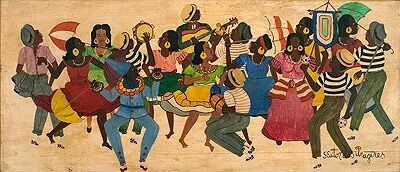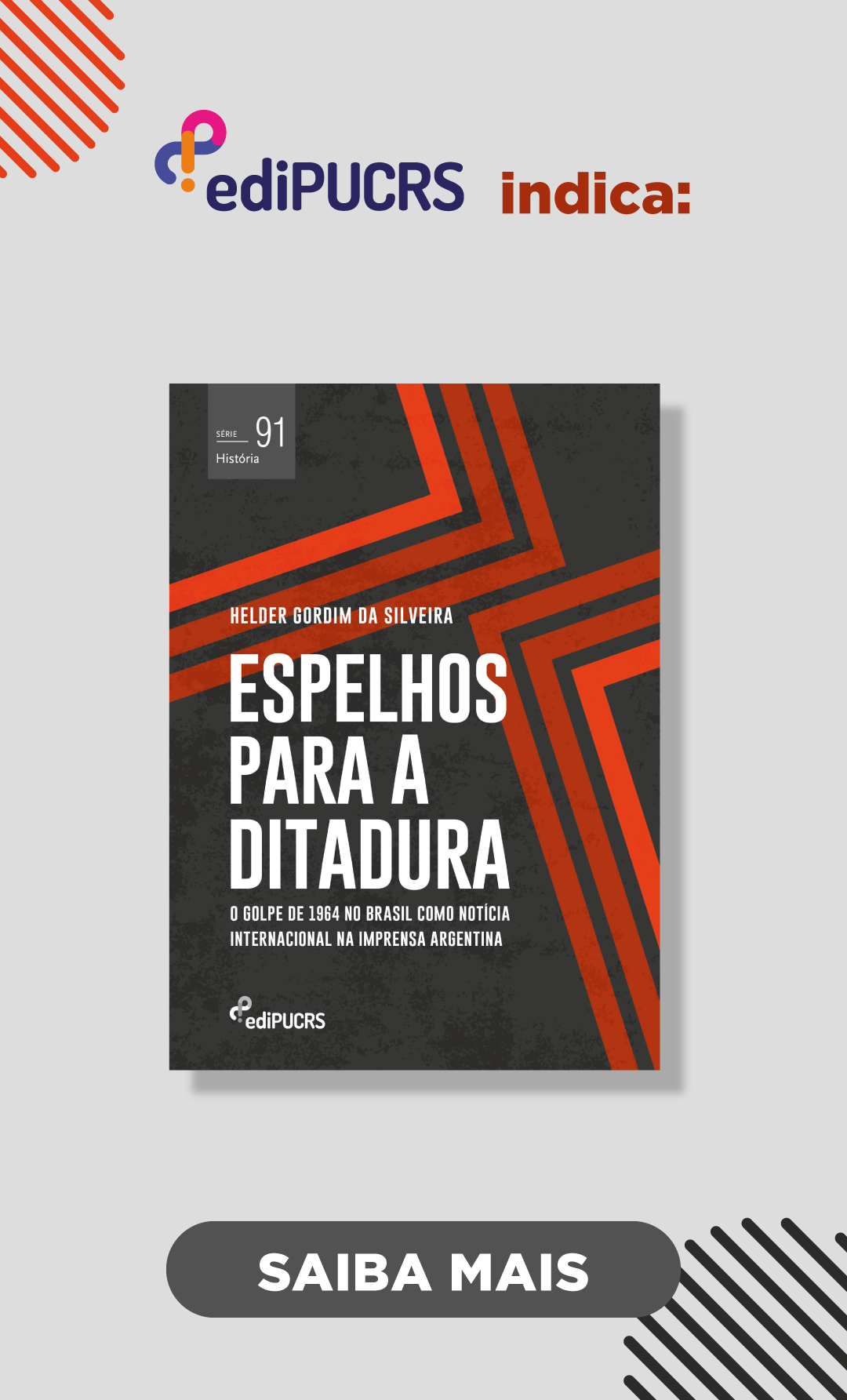Os livros de segredos italianos e o desenvolvimento da ciência moderna
DOI:
https://doi.org/10.15448/2178-3748.2014.2.18871Palavras-chave:
Livros de segredos, Hermetismo, Empirismo, Ciência ModernaResumo
Os livros de segredos foram um gênero de enorme sucesso nos séculos XVI e XVII, que unia elementos de diversas tradições: técnicas, hermetismo, alquimia, medicina empírica e magia natural. Graças à imprensa, traduções e reedições desses livros circularam por toda a Europa. Os “professores de segredos” foram os articuladores de saberes científicos e populares que se difundiram através de seus livros. O sincretismo da literatura de segredos ajudou a formar redes de transmissão de saberes, em que múltiplos agentes participaram. Como resultado desses encontros culturais, formou-se uma nova percepção do homem como operador sobre a natureza. Através da experiência, o homem podia melhor compreender a natureza e, através das técnicas, até mesmo melhorá-la, para seu próprio benefício. Essa concepção surgida do encontro da herança hermética com o universo do artesão, exemplificada pelos livros de segredos, facilitou o desenvolvimento tanto de um empirismo quanto de uma promessa de acesso ao saber que constituem a base da ciência moderna e do método experimental.Downloads
Referências
Referências bibliográficas
ANDRIES, Lis. Le Grand livre des secrets. Le Colportage en France aux 17e et 18e siècles. Paris: Imago, 1994.
ANDRIES, Lise; BOLLÈME, Geneviève. La Bibliothèque bleue. Littérature de colportage. Paris: Robert Laffont, 2003.
BELFANTI, Carlo Marco. Corporations et brevets : les deux faces du progrès technique dans une économie préindustrielle (Italie du Nord, XVIe – XVIIIe siècles). In: HILAIRE-PEREZ, Liliane; GARÇON, Anne-Françoise. Les Chemins de la nouveauté : Innover, inventer au regard de l’histoire. Paris: Comité des Travaux Historiques et Scientifiques, 2003.
BERETTA, Marco. Storia materiale della scienza: dal libro ai laboratori. Milão: Bruno Mondadori, 2002.
BONNEMAIN, Henri. Remèdes secrets. Revue d'histoire de la pharmacie, ano 89, N. 332, p. 471-476, 2001.
BOTREL, Jean-François. Une Bibliothèque bleue espagnole ? Les Historias de cordel (XVIIe-XXe siècle). In: DELCOURT, Thierry; PARINET, Élisabeth. La Bibliothèque bleue et les littératures de colportage. Paris: École des Chartes/Troyes, 2000, p. 193-209.
CAVAZZA, Marta. Metafore venatorie e paradigmi indiziari nella fondazione della scienza sperimentale. Annali dell’Istituto di Discipline filosofiche dell’Università di Bologna, Bologna, n. 1, v. I, p. 107-111, 1979-80.
COHEN, Floris. The Scientific Revolution: A Historiographical Inquiry. Chicago: Chicago University Press, 1994.
COPENHAVER, Brian. Hermes Trismegistus, Proclus, and the Question of a Philosophy of Magic in the Renaissance. In: DEBUS, Allen; MERKEL, Ingrid. Hermeticism and the Renaissance: Intellectual History and the Occult in Early Modern Europe. Cranbury: Associated University Presses, 1988.
COPENHAVER, Brian. Natural Magic, Hermetism, and Occultism in Early Modern Science. In: LINDBERG, David; WESTMAN, Robert. Reappraisals of the Scientific Revolution. Cambridge: Cambridge University Press, 1990.
CORSANO, Antonio. Per la storia del pensiero del tardo Rinascimento: Opere scelte. Taurisano: Congedo, 2002.
CORSINI, Andrea. Medici ciarlatani e ciarlatani medici. Bologna: Zanichelli, 1922.
CORTESI, Paolo. Storia e segreti dell’alchimia. Roma: Newton & Compton, 2005.
DEBLOCK, Geneviève. Astuces, Farces, Magie: Les Recettes de divertissements du ‘Bâtiment des recettes’ (XVIe – XIXe siècles). Techniques & Culture, Paris, n. 59, p. 25-39, 2012.
EAMON, William. How to Read a Book of Secrets. In: LEONG, Elaine; RANKIN, Alisha. Secrets and Knowledge in Medicine and Sciences: 1500-1800. Farnham: Ashgate, 2011.
EAMON, William. Science and the Secrets of Nature: Books of Secrets in Medieval and Early Modern Culture. Princeton: Princeton University Press, 1994.
EAMON, William. The Professor of Secrets: Mystery, Medicine, and Alchemy in Renaissance Italy. Washington: National Geographic, 2010.
EISENSTEIN, Elizabeth. The Printing Press as an Agent of Change. Cambridge: Cambridge University Press, 1979.
FERGUSON, John. Bibliographical Notes on Histories of Inventions and Books of Secrets. Staten Island: Pober, 1998.
FERGUSON, John. The Secrets of Alexis: a Sixteenth Century Collection of Medical and Technical Receipts”. Londres: Society of Antiquaries, 1897.
FESTUGIERE, André-Jean. Hermétisme et mystique païenne. Paris: Aubier-Montaigne, 1967.
HALLEUX, Robert. Le Savoir de la main: Savants et artisans dans l’Europe pré-industrielle. Paris: Armand Colin, 2009.
HALLEUX, Robert. Savoirs techniques. In: BLAY, Michel; HALLEUX, Robert. La science classique: XVIe-XVIIIe siècle, Dictionnaire critique. Paris: Flammarion, 1998.
JENSEN, William. The Leyden and Stockholm Papyri: Greco-Egyptian Chemical Documents from the Early 4th Century AD, An English Translation with Brief Notes by Earle Radcliffe Caley. Cincinnati: University of Cincinnati Press, 2008.
KAVEY, Allison. Books of Secrets: Natural Philosophy in England, 1550-1600. Chicago: University of Illinois Press, 2007.
KENNY, Neil. The Metaphorical Collecting of Curiosites in Early Modern France and Germany. In: WESTON-EVANS, Robert-John; MARR, Alexandre. Curiosity and Wonder from the Renaissance to the Enlightenment. Oxford: Ashgate, 2006, p. 43-62.
LESAGE, Claire. La Littérature des ‘Secrets’ et I secreti d’Isabella Cortese. Chroniques italiennes, Paris, n. 36, p. 145-178, 1993.
LONG, Pamela. Artisan/Practitioners and the Rise of New Sciences: 1400-1600. Corvallis: Oregon State University Press, 2011.
LONG, Pamela. Openness, Secrecy, Authorship: Technical Arts and the Culture of Knowledge from Antiquity to the Renaissance. Baltimore: Johns Hopkins University Press, 2001.
MANDROU, Robert. De la Culture populaire aux 17e et 18e siècles. Paris: Imago, 1999.
MCGUIRE, James. Neoplatonism and Active Principles: Newton and the Corpus Hermeticum. In: MCGUIRE, James; WESTMAN, Robert. Hermeticism and the Scientific Revolution: Papers read at a Clark Library Seminar. Los Angeles: William Andrews Clark Memorial Library, 1977.
MCGUIRE, James; RATTANSI, Piyo. Newton and the ‘Pipes of Pan’. Notes and Records of the Royal Society, Londres, n. 21, p. 108-143, dez. 1966.
OLSCHKI, Leonardo. Galileo's Philosophy of Science. The Philosophical Review, Durham, v. 52, n. 4, p. 349-365, jul. 1943.
OLSCHKI, Leonardo. Geschichte der neusprachlichen wissenschaftlichen Literatur, vol. 3, Galileo und sein Zeit. Halle: Niemeyer, 1927.
REITH, Reinhold. The Circulation of Skilled Labour in Late Medieval and Early Modern Central Europe. In: EPSTEIN, Stephan; PRAK, Maarten. Guilds, Innovation and the European Economy: 1400-1800. Cambridge: Cambridge University Press, 2010.
RIZZARDINI, Massimo. Secretum: Alchimia, medicina e politica del corpo nel Rinascimento. Milão: Francesco Bevivino, 2009.
ROSSI, Paolo. Francesco Bacone: Dalla magia alla scienza. Bologna: Il mulino, 2004.
ROSSI, Paolo. Immagini di Galileo. Convegno Internazionale “Galileo 350 anni dopo”, Florença-Pisa, 15-17 de fevereiro de 1993.
SMITH, Pamela. The Body of the Artisan: Art and Experience in the Scientific Revolution. Chicago: University of Chicago Press, 2004.
SMITH, Pamela. What is a Secret: Secrets and Craft Knowledge in Early Modern Europe. In: LEONG, Elaine; RANKIN, Alisha. Secrets and Knowledge in Medicine and Sciences: 1500-1800. Farnham: Ashgate, 2011.
SPUFFORD, Margaret. The Great Reclothing of Rural England: Petty Chapman and their Wares in the Seventeenth Century. London: Hambledon Press, 1984.
STEWARD, Larry. Science, Instruments and Guilds in Early Modern Britain. Early Science and Medicine, Nijmegen, v. 10, n. 3, 2005.
TELLE, Joachim. Pharmazie und der gemeine Mann. Hausarznei und Apotheke in deutsche Schriften der frühen Neuzeit. Wolfenbuttel: Herzog August Bibliothek, 1982.
THORNDIKE, Lynn. A History of Magic and Experimental Science. Nova Iorque: Columbia University Press, 1923-56, v. VI e VIII.
WEBSTER, Charles. From Paracelsus to Newton. Magic and the making of Modern Science. Cambridge: Cambridge University Press, 1980.
WHITE, Lynn. Medieval Religion and Technology: Collected Essays. Los Angeles: University of California Press, 1978.
YATES, Frances. Giordano Bruno and the Hermetic Tradition. Oxon: Routledge Classics, 2002.
YATES, Frances. The Hermetic Tradition in Renaissance Science. In: SINGLETON, Charles. Art, Science and History in the Renaissance. Baltimore: Johns Hopkins, 1968.
ZIMMERMAN, Birgit. Das Hausarzneibuch: Ein Beitrag zur Untersuchung laienmedizinischer Fachliteratur des 16: Jahrhunderts unter besonderer Beruck-sichtigung ihres humanmedizinisches-pharmazeutischen Inhalts. Marburg: Diss. med. Univ. Marburg/Lahn, 1975.
Fontes documentais
AGRIPPA VON NETTESHEIM, Heinrich Cornelius, La filosofia occulta o la magia (De occulta philosophia), Roma,1533.
CORTESE, Isabella. I secreti de la signora Isabella Cortese, ne’quali si contengono cose minerali, medicinali, arteficiose, e alchemique, e molte de l’arte profumatoria, apartenente a ogni gran signora, con altri bellissimi secreti aggiunti. Veneza, 1565
CORTESE, Isabella. I secreti della signora Isabella Cortese. Veneza, 1584.
CORTESE, Isabella. I secreti della signora Isabella Cortese: ne quali si contengono cose minerali, medicinali, artificiose & alchimiche : et molte dell'arte profumatoria..., Veneza, 1603.
DELLA PORTA, Giambattista. Magiae naturalis, siue de miraculis rerum naturalium, Napoles, 1558.
DELLA PORTA, Giambattista. La magie naturelle : qui est, les secrets et miracles de nature mise en quatre livres par Jean Baptiste porta Neapoletain…, Paris, 1615.
DELLA PORTA, Giambattista. Della magia naturale del signor Gio Battista della Porta, Napoles, 1677.
DELLA PORTA, Giambattista. Natural Magick by John Baptista Porta: a neapolitane in twenty books. Londres, 1658.
FIORAVANTI, Leonardo. Capricci medicinali. Veneza, 1561.
FIORAVANTI, Leonardo. Del compendio de i secreti rationali [di] M. Leonardo Fioravanti Bolognese. Veneza,1564
FIORAVANTI, Leonardo. Il tesoro della vita humana dell’eccelente dottore e Cavalier M. Leonardo Fioravanti Bolognese. Veneza, 1570.
GARZONI, Tommaso. La Piazza universale di tutte le professioni del mondo: con l’aggionta d’alcune bellissime annotationi a discorso per discorso. Veneza: Giovanni Battista Somasco, 1589, p. 189.
PIEMONTESE, Alessio (?). De' secreti del reverendo Donno Alessio Piemontese. Milão, 1559.
PIEMONTESE, Alessio (?). De secretis libri sex mira quamdam rerum varietate referti ex italico in latinum sermonem nunc primum translati per Ioannem Iacobum Weckerum, medicum, Lyon, 1561.
PIEMONTESE, Alessio (?). Empirie, et secrets du s. Alexis piemontois. Antuérpia, 1561.
Downloads
Publicado
Como Citar
Edição
Seção
Licença
Direitos Autorais
A submissão de originais para a Oficina do Historiador implica na transferência, pelos autores, dos direitos de publicação. Os direitos autorais para os artigos publicados nesta revista são do autor, com direitos da revista sobre a primeira publicação. Os autores somente poderão utilizar os mesmos resultados em outras publicações indicando claramente a Oficina do Historiador como o meio da publicação original.
Licença Creative Commons
Exceto onde especificado diferentemente, aplicam-se à matéria publicada neste periódico os termos de uma licença Creative Commons Atribuição 4.0 Internacional, que permite o uso irrestrito, a distribuição e a reprodução em qualquer meio desde que a publicação original seja corretamente citada.






